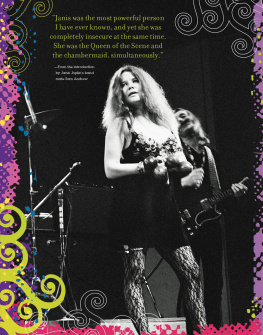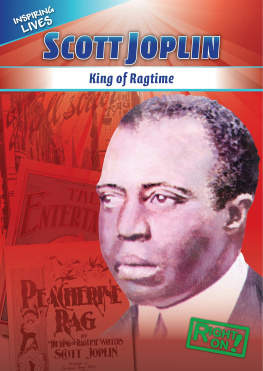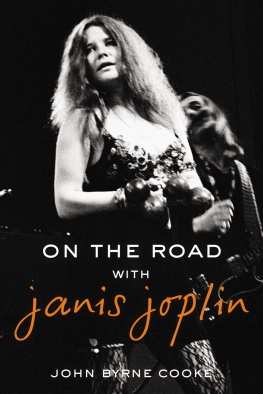

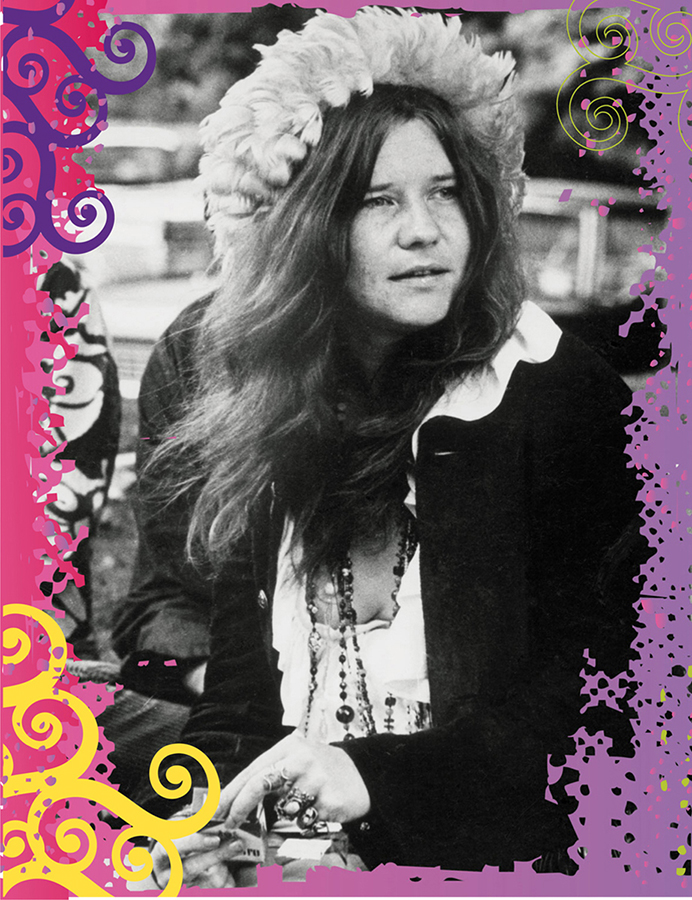

Library of Congress Cataloging-in-Publication Data
Angel, Ann, 1952
Janis Joplin : rise up singing / Ann Angel.
p. cm.
ISBN 978-0-8109-8349-6 (alk. paper)
eISBN 978-1-6833-5597-7
1. Joplin, JanisJuvenile literature. 2. SingersUnited StatesBiographyJuvenile literature. 3. Rock musiciansUnited StatesBiographyJuvenile literature. I. Title.
ML3930.J65A83 2010
782.42166092dc22
[B]
2010005558
Text copyright 2010 Ann Angel
Book design by Maria T. Middleton
Published in 2010 by Amulet Books, an imprint of ABRAMS. All rights reserved. No portion of this book may be reproduced, stored in a retrieval system, or transmitted in any form or by any means, mechanical, electronic, photocopying, recording, or otherwise, without written permission from the publisher. Amulet Books and Amulet Paperbacks are registered trademarks of Harry N. Abrams, Inc.
Amulet Books are available at special discounts when purchased in quantity for premiums and promotions as well as fundraising or educational use. Special editions can also be created to specification. For details, contact specialmarkets@abramsbooks.com or the address below.

ABRAMS The Art of Books
195 Broadway, New York, NY 10007
abramsbooks.com
For JeffYou always rock my world
Contents
Introduction
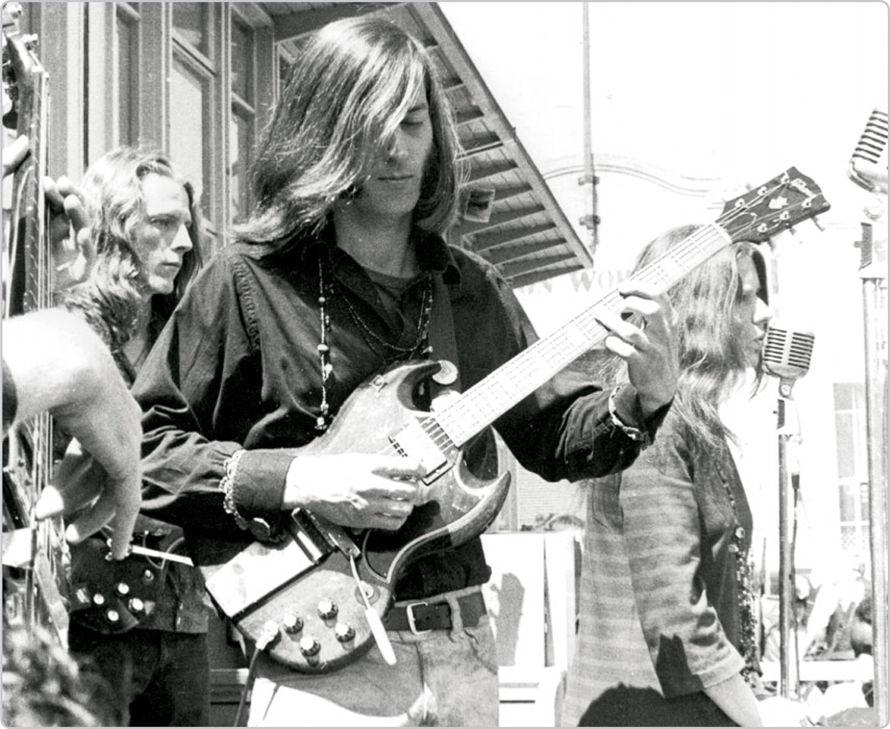
Sam Andrew plays guitar while Janis sings. Band mate James Gurley is in the background. After playing together in Big Brother and the Holding Company and the Kozmic Blues, Janis and Sam remained friends.
Janis Joplin was my best friend. I played with her more nights and days than any other musician in her life. We were both obsessed with how to make the music better. When we drove home after playing, all we talked about was how to improve what we were doing. What an intro would do here, what a series of notes would do there, when the drummer should come in, how this song would be better than that song as a final tune.
Janis was the most powerful person I have ever known, and yet she was completely insecure at the same time. She was the Queen of the Scene and the chambermaid, simultaneously. It was always, Hey, how was I? Do you think they liked it? I mean, it was all right, wasnt it? What do you think? Tell me. I want to know. You like me, dont you? You really like me, right? Dont just stand theretell me what you think. Was I good? Did I do all right?
From a person as talented as Janis was, such questions could be unnerving. Her talent was so obvious, but often she couldnt see it herself. People discount what they do best, because they think, Well, hey, this is easy, anybody can do this, so whats so special? Janis made me realize that what we do best, all of us, is natural to us, and easy to take for granted. This is completely understandable, and yet it is important for each of us to appreciate our natural gifts, and take pride in them.
We all like to pretend that we are above caring what others think of us, and that we can be indifferent to both praise and blame in our better moments, but alas, we often fall short. Janis was no exception. She may even have cared too much what people said about her. We were somewhereNew York, Cleveland, maybe even San Franciscoand a critic wrote, Janis Joplin has true melisma in her singing. She had to look up melisma in the dictionary, where it was described as many different scale tones used over the same word in singing, a common vocal technique in Gospel or choir music. After she had learned what it meant, Janis didnt stop saying the word melisma for a week. Thats the way she was about praise. She couldnt get enough of it.
Janis loved Ma Rainey, Bessie Smith, Victoria Spiveyreal pioneers in blues, singing in an era (the 1920s) when it really counted to sing with feeling and power. You can hear their influence in Janiss singing. Janis herself showed the way for people like Joan Jett, Patti Smith, Fiona Apple, Pink, and Lady Gagaeach one exhibits some facet of that Janis character and style. She was vulnerable, powerful, super wide open, talented, and interesting in a kind of terrifying way.
Many writers wrote that when Janis died, it was somehow a suicide, or maybe even that the music industry had murdered her. This is all as untrue as it is completely beside the point. Its important to realize that Janis had more fun than ten people; she was always alive, completely energetic, funnyvery funnyand strong. She was nobodys victim. It wasnt somehow ordained by fate that Janis should die so young. Her death was an accident. Janis had big appetites. If it was food, then she wanted to eat the most. If it was drink, then she, naturally, wanted to drink the most. If it was life and living, then she lived it, crackling with energy and cackling with laughter, wanting the most from every minute. There was electricity in the air when Janis was around, and I will always miss her.
Sam Andrew
Big Brother and the Holding Company
The Kozmic Blues
1
Spreading Her Wings
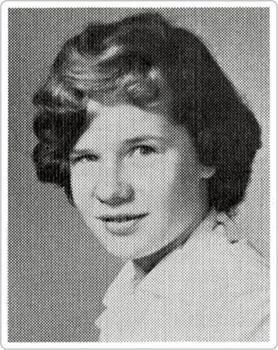
Janis Joplins school photo, taken in the tenth grade, shows her wearing a white blouse and sporting a curly bob, typical of the styles of the 1950s.
The popular girls wore their hair short and perfectly curled, with tiny bows fastened at their temples. Their skirts swung demurely as they walked down the school halls. The round Peter Pan collars of their blouses were buttoned neatly and decorated with tasteful circle pins and pearl necklaces. The girls were pretty and petite, their soft, jingling southern laughs drawing smiles from teachers and from the boys who jostled for their attention.
Janis Joplin had only to look in the mirror to see frizzy brown waves of hair that refused to be tamed and a plump face spotted with acne. She was heavier than the other girls. Louder too. When she laughed, it came out as a cackle or a raspy, flat hah!
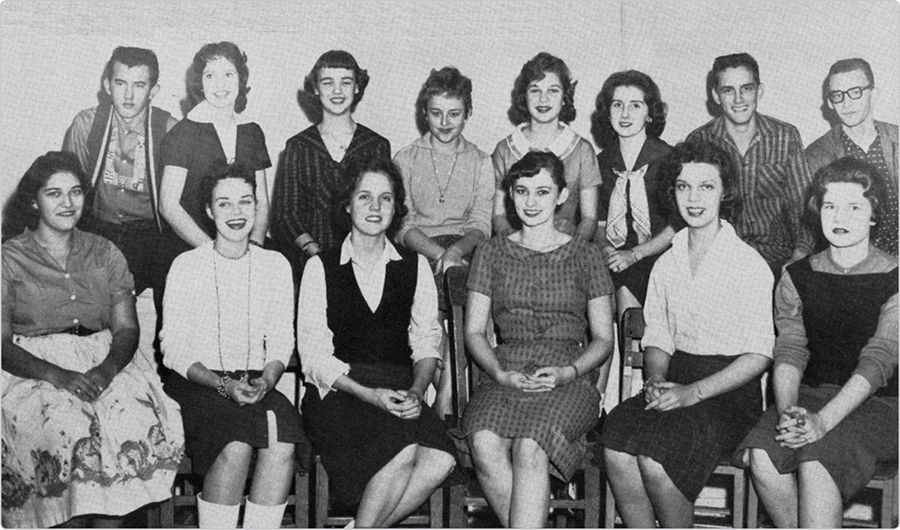
This yearbook photo shows Janis as a member of an extracurricular group, one of many she participated in, which included the Future Teachers of America, the Slide Rule Club, and the Glee Club. Janis is in the front row, on the far right.
She was smart and well read, but brains werent a ticket to popularity in Port Arthur, Texas, in the 1950s. Janiss classmates expected to graduate, marry their high school sweethearts, and settle down to raise families. The girls expected to stay at home, just as their mothers had. The boys expected to work for the oil refinery, the main business in town. Being smart wasnt as important as behaving like a good, churchgoing American.
Next page
